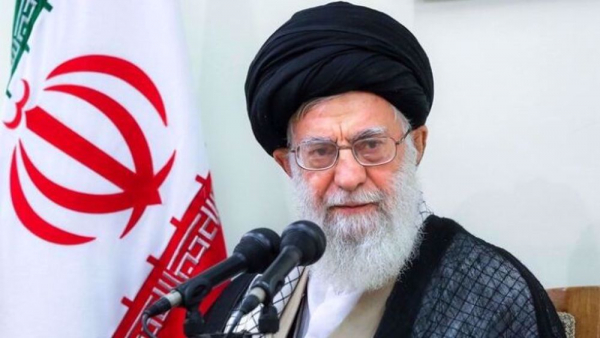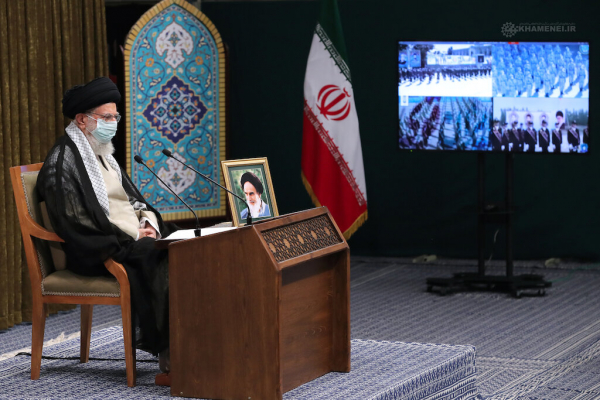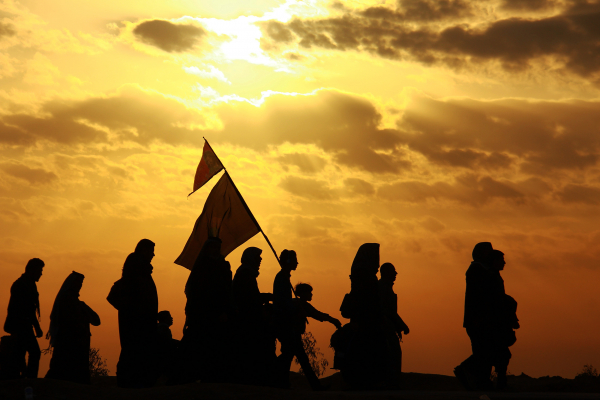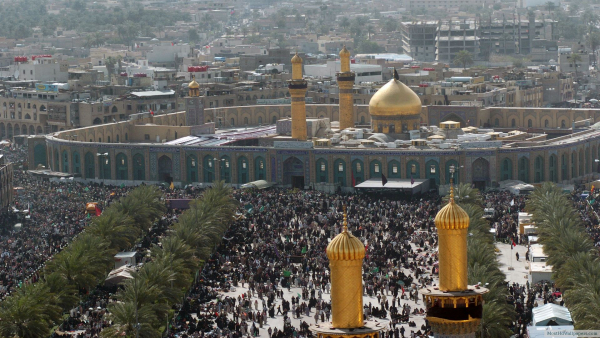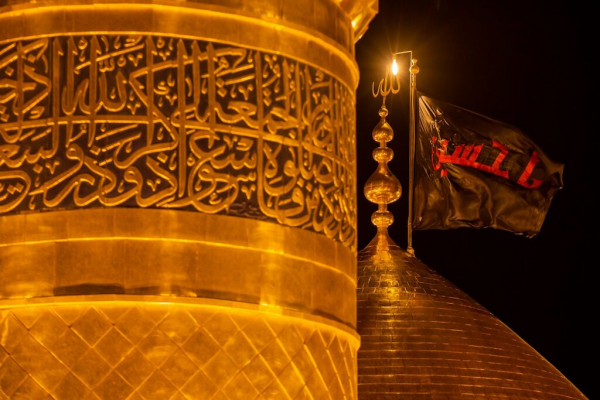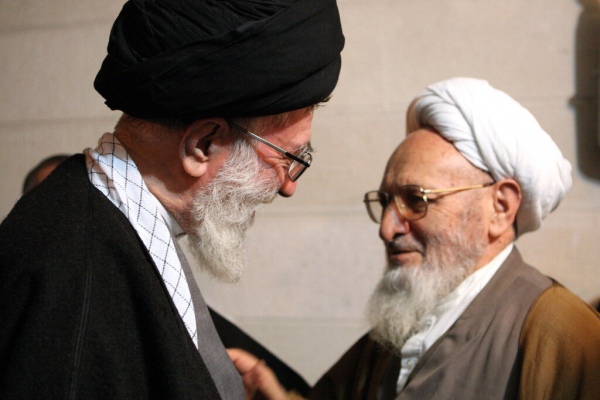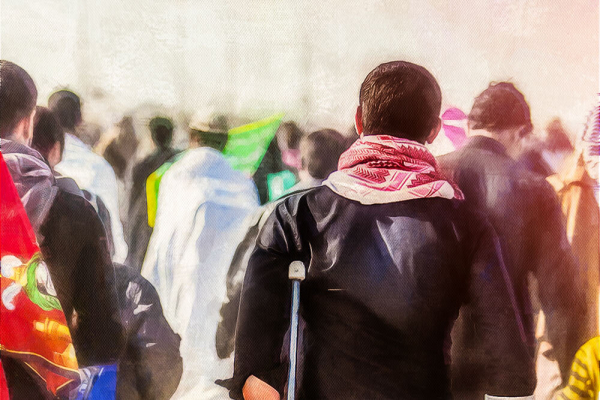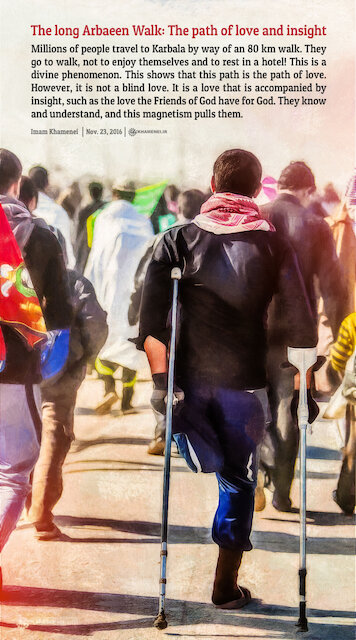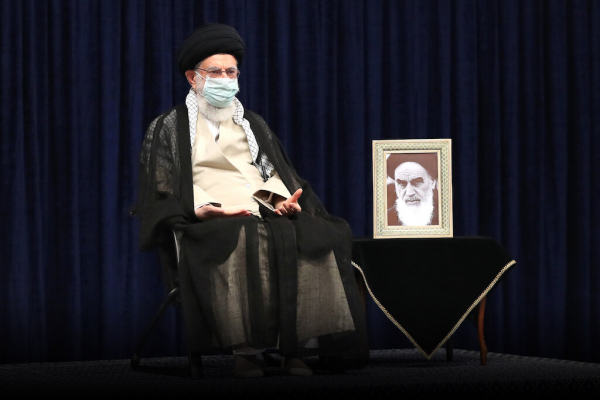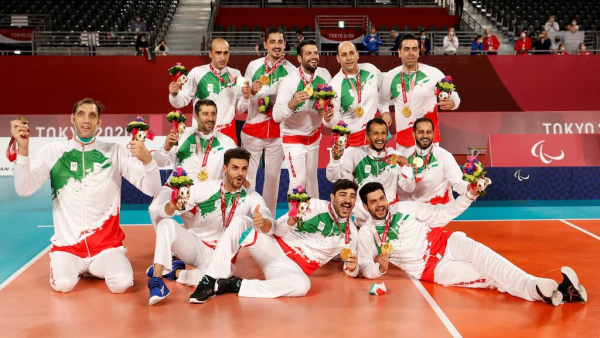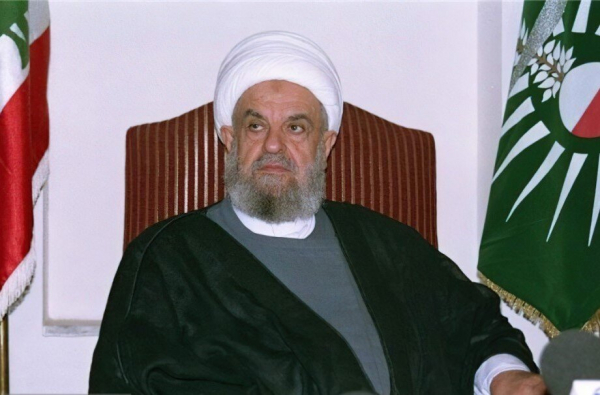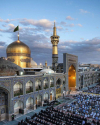hasania
Ayatollah Khamenei urges officials in ‘brotherly Afghanistan’ to punish Friday attack perpetrators
Leader of the Islamic Revolution Ayatollah Seyyed Ali Khamenei has called on Afghanistan’s authorities to punish the perpetrators behind the Friday terrorist attack targeting worshippers at a packed Shia mosque in the northern Afghan city of Kunduz.
“The bitter, tragic incident involving a blast at the mosque of Khanabad district of Kunduz province, which resulted in the deaths of a large number of faithful worshippers, saddened us,” Ayatollah Khamenei wrote in a message on Saturday.
“Authorities in the neighboring and brotherly country of Afghanistan are seriously expected to punish the bloodthirsty perpetrators of this heinous crime and take necessary measures to prevent a recurrence of such tragedies,” he added.
The Leader also asked God to bestow mercy and the highest heavenly blessings upon the souls of the martyrs of the incident, and prayed for the immediate recovery of the wounded and patience for the bereaved.
On Friday, a bomber attacked a Shia mosque in Afghanistan’s northeastern Kunduz province, killing and injuring hundreds of worshippers. The Daesh terrorist group claimed responsibility for the attack.
The attack followed other similar ones in Afghanistan in recent weeks.
Since the Taliban took power in the country, the Daesh’s branch there has ramped up attacks.
The Taliban have vowed to eradicate Daesh.
Meanwhile, a spokesman for the militant group told The Associated Press on Saturday that it would not work with the US to eradicate Daesh in Afghanistan.
“We are able to tackle Daesh independently,” Taliban political spokesman Suhail Shaheen told AP, when asked whether the Taliban would cooperate with the US to contain the notorious terrorist group.
Iranian Parliament Speaker Mohammad Baqer Qalibaf also condoled with the Afghan nation and those who lost their loved ones, while calling on the country’s new authorities to act decisively against the culprits and prevent a recurrence of such painful atrocities targeting people of different religions.
“The criminal hand of the foolish terrorists was once again stained with the blood of the oppressed worshipers in line with anti-Islam [bigotry] and Islamophobia,” Qalibaf wrote in his message.
Criticizing those who seemingly champion human rights over their silence in the face of the terrorist attack, the parliament speaker said the international community is expected to condemn such tragedies, introduce the already-infamous sponsors of terrorists, and commit them for trial.
Region needs independent armies reliant on their own nations
The following is the full text of a speech delivered on October 3, 2021 by Imam Khamenei, the Leader of the Islamic Revolution, via videoconference to the graduates participating in the joint graduation ceremony held at Imam Hussain (pbuh) Military Academy.
In the Name of God, the Beneficent, the Merciful
Praise be to God, Lord of the Worlds, and peace and greetings upon our Master Muhammad, and his pure Household, particularly the remnant of God on earth.
Greetings upon Hussain, upon Ali bin al-Hussain, upon the children of Hussain and upon the companions of Hussain–those who generously laid down their lives for Hussain.
This ceremony is being held while the scent of Imam Hussain’s Arbaeen (40th) continues to caress the hearts and souls of vigilant individuals. I hope that all of us will be trained in the school of Imam Hussain (pbuh). I hope that you youth will achieve a high rank in the Academy of Hussain [figuratively speaking] as you have in your Military Academy. I wish to congratulate all the graduates from the Military Academies of the Armed Forces who will join the executive ranks in the Armed Forces from today. I would also like to congratulate all the youth who have received their epaulets today and who will take the first step in entering the Armed Forces of the Islamic Republic. I also wish to congratulate the Iranian nation on having such pious, righteous, courageous, determined, insightful youth and on having commanders who train them in such a magnificent way.
My dear ones, our Armed Forces take pride in that they are a strong fortress in our dear country. They are a solid castle for the country and the nation. As the Commander of the Faithful [Imam Ali (pbuh)] said, “The army is, by the will of God, the fortress of its people.” [Nahjul Balaghah, Letter 53] This has been realized in the country in the true sense of the word. Today, the organizations in our Armed Forces–including the Army, the Guard Corps, the Police Force and the Basij–are a defensive shield in the true sense of the word against the harsh threats posed by the enemies inside and outside the country.
Being a soldier for such a nation is a source of pride. You who are wearing a military uniform–of each and every military organization–feel proud of having prepared yourselves for defending the Iranian nation and for defending the Islamic, national, revolutionary identity of the country and ensuring the security of Iran.
Security is the most important issue to consider when looking at the Armed Forces. The security of a country is the fundamental infrastructure for all activities for progress. The infrastructure for all economic, scientific and political activities and all activities related to health and to public services is security. If security is absent in a country, then all these important, essential activities will be seriously disrupted. Therefore, the Armed Forces take pride in that they possess this infrastructure which has been achieved with their determination, willpower and their very lives. You should pay attention to this point. Every step you take is toward this great goal, and this is something that pleases God and the Friends of God.
An important point about security is that national security should not be in the hands of other countries. This is an important point. Today, our people and our country have become accustomed to the fact that the security of the country is in the hands of our own Armed Forces and our own people, but this is not the case everywhere in the world. You have witnessed in the recent tensions between the Europeans and the United States, in which the Europeans have declared that the Americans have stabbed them in the back, the main point is that the Europeans need to ensure their security themselves with their own forces and regardless of NATO whose main sponsor is the US. In other words, when the security of developed European countries is in the hands of or dependent on another country’s military force— even though that other force is not an open enemy of that country and even though they are part of the same group in appearances–they feel they have a serious shortcoming. And this is the truth of the matter. They do have a shortcoming. The less developed countries whose armies are completely under the control of the US Army and the like are in an even worse situation. If a country can ensure its security with its own skilled, trained forces, this is a great honor. Those who think that their security will be ensured by relying on other countries should know that they will soon pay a hefty price [for entrusting their security to foreigners].
One of the most catastrophic disasters for countries occurs when other countries interfere in their matters of security, plan their war and peace, and define their policies. It is a grave disaster for every country that is in such a situation. As I have mentioned, even European countries that breathe under NATO’s umbrella wish to move independently today.
Praise God, the Armed Forces of the Islamic Republic have proven in difficult, very important tests that they can ensure the security of the country–both the security of its borders and the security inside the country. An important, eternal example of this is the eight-year Sacred Defense during which our Armed Forces protected the security of the country in a powerful, honorable, glorious, dignified manner and expelled the occupying forces, inflicting serious damage on them and emerging victorious. “The fortress of the people” was truly realized in those years.
What does it mean when we speak of the authority of our Armed Forces? This is an important point. Obviously, the authority of the Armed Forces depends on their training, resourcefulness, various scientific advancements, equipment and organizational discipline. These matters themselves are essential and the Armed Forces definitely need them, just like and even more than other organizations. However, there is another very important element, and that is having good spirits and spirituality while being healthy in beliefs and morals. This is a very important matter that plays an extraordinary role in the authority of the Armed Forces. If this factor is missing in an army, even if they possess ample weapons and ammunitions, that army cannot claim to be an army with authority.
As you witnessed, the US army, equipped with all kinds of weapons–conventional and unconventional— entered our neighboring country, Afghanistan, to overthrow the Taliban government. They stayed in that country for 20 years killing people, committing crimes, occupying, promoting addictive drugs and destroying the limited infrastructure of Afghanistan. Then after 20 years, they handed over the government to the Taliban and left. They had come to remove the Taliban from power and they stayed in that country in that situation based on that claim for 20 years. They committed all these crimes, inflicted all this suffering and incurred this huge material and human loss. But in the end, they handed over the government to the Taliban and returned to their own country. This means that a fundamental, vital element was missing in their army, namely the spiritual, moral element. This means paying attention to God, the Exalted, and to spirituality. This is a lesson for all countries.
Moreover, we should pay attention to this fact that this is the nature of the US army. The Hollywood pictures that the US and countries like the US produce about their armies are untrue. The reality of their army is what you have seen in recent days. They went to Afghanistan making extravagant claims and then left in such a disastrous way. The same is more or less true about their presence in other countries too. In other countries where the US army is present, even if the rulers in those countries have not had the courage to throw them out, the Americans are hated by those nations. In every country where they are present–for example, in East Asian countries where the US army has been present for many years–they are hated by the people in those countries.
Well, we should pay attention to this that the presence of foreign armies, including the US army, in our own region is a source of destruction and war. Everyone should try to keep countries and their armies independent by relying on their own nations and cooperating with the armies of their neighboring countries and other armies in the region. This is in the best interest of the region. We and they should not allow foreign armies to travel thousands of miles–under the pretext of safeguarding their national interests while these issues have nothing to do with their nations–and to interfere in the affairs of our countries and our armies and to maintain a military presence here. The armies of regional nations can run the region on their own and you should not allow others to enter.
The events that are taking place in the northwest of our country in some of our neighboring countries are matters that must be resolved using this same logic. Of course, our country and our Armed Forces are acting wisely. Our approach in all matters is to act wisely, authority coupled with wisdom. It is good if other governments act wisely too and not permit the region to face serious problems. “Those who dig a hole for their brothers will be the first to fall into it.” [Speaking in Arabic]
I hope that God, the Exalted, will bestow success on all of you dear ones every day, on the honorable commanders of the Armed Forces and the commanders of various ranks, and finally on you, the dear youth who have a large, effective presence in the Armed Forces so that you can continue to have the honor to serve this country, to serve this system (the Islamic Republic), to serve the Revolution and to serve our pious, faithful people, and so that you can increase your preparedness on a daily basis.
Fortunately, the academies of our Armed Forces are progressive academies. Of course, not all of them are at the same level. Some of them move faster, more successfully and more efficiently and some have to try and make more promising moves. The reports I have from the academies are satisfactory in general. As I mentioned in the beginning of my speech, the Iranian nation should be congratulated for having you pious, determined and brave youth. God willing, God will protect all of you and raise our dear martyrs with the Friends of God and the Holy Prophet.
Greetings be upon you and God’s mercy and blessings.
Narrations on Karbala and the pilgrimage of Imam Hussain (as) part2
Hadith 21: The Condition of Honor
Imam Sadiq (as) said: Whoever wants to be in the neighborhood of the Prophet (pbuh&HP) and next to Ali (AS) and Fatima (AS) should not leave the pilgrimage of Imam Hussain (AS).
Wasa'il al-Shi'ah, vol. 10, p. 331, p. 39
Hadith 22: Pilgrimage, Divine Duty
Imam Sadiq (as) said: If one of you observes the Ihram of Hajj for the entire of his life but does not visit Imam Hussain (as), he has left the right of the Messenger of Allah (PBUH&HP) because the right of Hussain (as) is a divine duty and obligatory for every Muslim.
Wasa'il al-Shi'ah, vol. 10, p. 333
Hadith 23: Karbala, the Kaaba of Perfection
Imam Sadiq (as) said: Whoever does not visit the grave of Imam Hussain (as) until he dies, his faith will be incomplete and his religion will be incomplete, and when he goes to heaven, he will be lower than the believers there.
Wasa'il al-Shi'ah, vol. 10, p. .335
Hadith 24: From Pilgrimage to Martyrdom
Imam Sadiq (as) said: Do not leave the pilgrimage of Imam Hussain (as) and recommend it to your friends and companions as well! May Allah prolong your life, increase your sustenance, and may Allah bless you alive and you will not die except as a martyr.
Wasa'il al-Shi'ah vol. 10, p. 335
Hadith 25: The Hadith of Love
It was narrated from Imam Sadiq (as) that he said: Whoever Allah wants good, will put the love of Hussain (AS) and his pilgrimage in his heart, and whoever Allah wants bad, will have him hate Hussain (AS) and anxious with his pilgrimage.
Wasa'il al-Shi'ah vol. 10, p. 388, Sea of Lights, vol. 98, p. 76
Hadith 26: A Sign of Being a Shiite
Imam Sadiq (as) said: Whoever does not visit the grave of Imam Hussain and dies as our Shiite and dies, is not our Shiite, and even if he is from the people of Paradise, he is the guest of the people of Paradise.
Kamel Al-Ziyarat, p. 193, Bihar Al-Anwar, vol. 98, p.4
Hadith 27: Ascension Platform
Imam Sadiq (as) said: Whoever visits the grave of Hussain (as) and has knowledge of the right of that Imam, Allah Almighty will register him in the highest rank.
Man la yahzurul Faqih, vol. 2, p.581
Hadith 28: The School of Knowledge
Imam Musa Kadhim (as) said: The least reward that is given to the pilgrim of Imam Hussain (as) on the banks of the Euphrates is that all his sins, before and after, are forgiven. Provided that he knows the right, honor and guardianship of that Imam.
Mustadrak al-Wasa'il, vol. 10, p. 236, quoting Kamil al-Ziyarat, p. 138
Hadith 29: Like the Pilgrimage of Allah
Imam Reza (as) said: Whoever visits the grave of Imam Hussain (as) on the banks of the Euphrates is like the one who has visited Allah.
Mustadrak al-Wasa'il, vol. 10, p. 250, quoting in full
Chapter Three: Ashura and Arbaeen
Hadith 30: Pilgrimage at Ashura
Imam Sadiq (as) said: Whoever visits Imam Hussain (as) on the day of Ashura, heaven will be obligatory for him.
Iqbal al-A'mal, p. 568
Hadith 31: Above Prosperity
Imam Sadiq (as) said: Whoever wakes up on the night of Ashura next to the shrine of Imam Hussain (as), on the Day of Judgment he will rush to Allah stained in his blood, like someone who was killed in Karbala next to Imam Hussain (as).
Wasaelu shiah, vol. 10, p.372
Hadith 32: Signs of Faith
Imam Hassan Askari (as) said: The signs of a believer are five:
1 Fifty prayers
2 Arbaeen pilgrimage
3 Ring in the right hand
4 Prostrating on the ground
5 Saying loudly the name of Allah, (Bismillah Rahman Rahim)
Wasaelu shia, vol. 10, p. 373, and also Al-Tahdhib, vol. 6, p. 52
Chapter Four: Torbat and Tasbih of Love
Hadith 33: His Porch
The Prophet of Islam (PBUH&HP) said: Know that the answer to prayer is under the dome of his shrine and healing is in his soil, and the Imams (as) are of his children.
Mustadrak al-Wasa'il, vol. 10, p.335
Hadith 34: Soil and Training
Imam Sadiq (as) said: Take your children with the soil of Hussain (as) (Karbala) because the soil of Karbala insures your children.
Wasaelu Shiah, vol. 10, p.410
Hadith 35: The Greatest Medicine
Imam Sadiq (as) said: The cure for any pain is in the soil (torbat) of Hussain (as) and it is the greatest medicine. Kamil Al-Ziyarat, p. 275 and Wasa'il al-Shi'ah, vol. 10, p. 410
Hadith 36: Torbat (soil of Karbala) and seven hijabs
Imam Sadiq (as) said: Prostration on the soil of Hussain (as) tears the seven veils.
Mesbah al-Muttahid, p. 511, and Bihar al-Anwar, vol. 98, p. 135
Hadith 37: Prostration on the Soil of Love
Imam Sadiq (as) did not prostrate on the ground except on the soil of Hussain (as) and he did this in violence for the sake of Allah.
Wasailu shiah vol. 3, p.608
Hadith 38: Rosary with the Soil of Karbala
Imam Sadiq (as) said: Prostration on the soil of Karbala can light up to the seventh earth, and whoever has a rosary from the soil of the shrine of Hussain (as) with him, is a truthful person, even if he says nothing.
Man la yahzurulFaqih vol 1 p 268
Hadith 39: Healing Soil
Imam Kadhim (as) while narrating a hadith announcing his death, said: do not take anything from the soil of my grave to seek blessings, because it is forbidden for us to eat any soil except the soil of my grandfather Hussain (as), Allah Almighty has healed only the soil of Karbala for the Shiites and our friends.
Jami ahadith, vol. 12, p.533
Hadith 40: One of the Four Needs
Imam Musa ibn Ja'far (as) said: Our needs are four things:
1. Prayer mat on which prayers are offered.
2. Rings on the finger
3. Toothbrush with which to brush teeth
4. A rosary from the shrine of Imam Hussain (as) Tahdhib al-Ahkam, vol. 6, p. 75
Narrations on Karbala and the pilgrimage of Imam Hussain (as)-part1
Chapter One: The Virtue of Karbala
Hadith 1: Pure Privacy
The Prophet of Islam (PBUH&HP) said in a long hadith: Karbala is the purest tomb on earth and the highest in terms of respect, and it is true that Karbala is one of the expanses of Paradise.
Bihar al Anwar, vol. 98, p. 115, Kamil Al-Ziyarat, p. 264
Hadith 2: The Land of Salvation
The Prophet of Allah (PBUH&HP) said: My son Hussain will be buried in a land called Karbala, a privileged land that has always been the dome of Islam, just as God saved Noah's faithful companions from the flood there. Kamil Al-Ziyarat, p. 269, Chapter 88, H8
Hadith 3: The Slaughterhouse of Love
Imam Ali (as) passed through Karbala one day and said: This is the altar of lovers and place of martyrdom of martyrs whose place neither the past nor the future martyrs can reach.
Tahdhib, vol. 6, p. 73 and Bihar, vol. 98, p. 116
Hadith 4: The Perfume of Love
Imam Ali (as) addressed the soil of Karbala and said: What a fragrance, O soil! On the Day of Judgment, a people will rise from you who will go to heaven immediately and without reckoning.
Explanation of Nahj al-Balaghah Ibn Abi Al-Hadid, vol. 4, p. 169
Hadith 5: The Red Star
Imam Sajjad (as) said: The land of Karbala, on the Day of Judgment, shines like a pearl star and cries out that I am the holy land of God, the pure and blessed land that surrounds the leader of the martyrs and the ruler of the youth of Paradise. Kamil al-Ziyarat, p. 268
Hadith 6: Karbala and Jerusalem
Imam Sadiq (as) said: Karbala is from the land of Jerusalem.
Kamil Al-Ziyarat, p. 269, Chapter 88, H7
Hadith 7: Euphrates and Karbala
Imam Sadiq (as) said: The land of Karbala and the water of the Euphrates were the first land and the first water which Allah Almighty sanctified and honored.
Bihar Al-Anwar, vol. 98, p. 109 and also Kamil Al-Ziyarat, p. 269
Hadith 8: Karbala, the Kaaba of the Prophets
Imam Sadiq (as) said: There is no prophet in the heavens and the earth unless they want Allah Almighty to allow them to visit Imam Hussein (as). It is as if a group descends to Karbala and a group ascends from there. Mustadrak al-Wasa'il, vol. 10, p. 244
Hadith 9: Karbala, Mataf of the Angels
Imam Sadiq (as) said: There is no angel in the heavens and the earth unless Allah Almighty wants to allow to visit Imam Hussain (as). It is always the case that a regiment of angels descends to Karbala and another regiment ascends and ascends from.
Mustadrak al-Wasa'il, vol. 10, p. 244
Hadith 10: The Way to Heaven
Imam Sadiq (as) said: The tomb of Imam Hussain (as) is a door to the gates of Paradise.
Kamel Al-Ziyarat, p. 271, Chapter 89, H1
Hadith 11: Karbala, a Safe Sanctuary
Imam Sadiq (as) said: Indeed, God made Karbala a safe and blessed sanctuary before making Mecca a sanctuary. Kamil al-Ziyarat, p. 267 Bihar, vol. 98, p. 110
Hadith 12: Continuous Pilgrimage
Imam Sadiq (as) said: Visit Karbala and continue doing so because Karbala has embraced the best sons of the prophets. Kamil al Ziarat, p. 269
Hadith 13: Blessed Court
Imam Sadiq (as) said: The "safe valley shore" that God has mentioned in the Quran is the Euphrates and the "blessed court" is Karbala. Bihar al Anvar vol 57. P 203
Chapter Two: Pilgrimage to Karbala
Hadith 14: The desire for pilgrimage
Imam Baqir (as) said: If people knew what virtue it is to visit the shrine of Imam Hussain (as), they would die of enthusiasm for pilgrimage. Thawab al-A'mal, p. 319
Hadith 15: Acceptable and Privileged Hajj
Imam Baqir (as) said: Visiting the grave of the Messenger of Allah (PBUH&HP), and visiting the shrine of the martyrs, and visiting the shrine of Imam Hussain (AS) are equivalent to the acceptable Hajj performed together with prophet Muhammad (PBUH&HP). Mustadrak al-Wasa'il, vol. 1, p. 266 ,
Hadith 16: A New Birth
Hamran says: When I returned from the pilgrimage of Imam Hussain (as), Imam Baqir (as) came to me and said: O Hamran! I give you the good news that whoever visits the graves of the martyrs of the family of Prophet Muhammad (PBUH&HP) and his intention is to please Allah and approach the Prophet (PBUH&HP), he will come out of his sins like the day his mother gave birth to him.
Amali Sheikh Tusi, Vol. 2, p. 28
Hadith 17: Pilgrimage of the oppressed
It was narrated from Imam Baqir (as) and Imam Sadegh (as) that they said: Whoever wants to be his abode and refuge in Paradise, should not leave the pilgrimage of the oppressed (as).
Mustadrak al-Wasa'il, vol. 10, p. 253
Hadith 18: Martyrdom and Pilgrimage
Imam Sadiq (as) said: Visit the shrine of Imam Hussain (as) and do not do bad to him by leaving his pilgrimage because he is the master of the youth of Paradise and the lord of the martyred youth.
Mustadrak al-Wasa'il, vol. 10, p. 256
Hadith 19: Pilgrimage, the Best Deed
Imam Sadiq (as) said: Visiting the grave of Imam Hussain (as) is one of the best things that can be done. Mustadrak al-Wasa'il, vol. 10, p. 311
Hadith 20: Tablecloths of light
Imam Sadiq (as) said: Whoever wants to sit on the tables of light on the Day of Judgment should be one of the pilgrims of Imam Hussain (as).
Wasa'il al-Shi'ah, vol. 10, p.
Why did Islamic community consent to murder of Prophet’s (pbuh) grandson, 50 years after his demise?
“When Hussain's few companions were defeated in the battle with Omar Saad's army, Hussain rode his horse to the Euphrates River... The army stood between him and the water, knocked down his horse, and shot at him as a result of which blood flowed from his body. At this time, about ten soldiers moved to the tents where the children and women who had come with Hussain (pbuh) were located. Seeing this movement of the enemy, Hussain (pbuh) also stepped toward the tents. They prevented him. Hussain (pbuh) told them, ‘Woe to you! Even if you do not practice a religion and even if you are not afraid of the Day of Judgment, at least be free and honorable in your worldly life and do not let my tent, my household be at the disposal of the thugs and ignorant members of your army.’ They surrounded Hussain (pbuh). At this time, a child wanted to reach Hussain (pbuh) from the tents. But Zainab, the sister of Imam Hussain, held him back. Hussain asked his sister to hold onto him, but the child freed himself, reached his uncle Hussain and stood beside him. At this time, one of those who had surrounded him targeted the Imam with his sword. The child used his hand as a shield and his hand was cut off. Hussain (pbuh) embraced him and finally the child was martyred by an arrow.”[1]
This is one of the scenes of Karbala. It took place after the martyrdom of Hussain's companions one after another and before the horrific scenes of the attack and looting of the tents by the claimants present in the army who had been sent by the so-called ruler of the Islamic country!
It is hard to believe that the last moments of the life of the children of the Messenger of God passed in this way among those who claimed to follow his grandfather's religion, namely their prophet. But according to Islamic historical sources and narrations, this event cannot be denied. It seems that differences between the followers of religions are a historical tradition. But how can this level of cruelty toward the closest people to the Prophet of God be believed, and how can this be analyzed?
Strangely enough, historical evidence suggests that most ordinary people who were even willing to take part in the campaign against Imam Hussain (pbuh) were not satisfied with this extent of cruelty and were basically dissatisfied with the killing of the son of the Messenger of God.[2] So how did such an event take place in their presence and with their support?
Regarding the origin of this event and considering the Islamic society to be divided into three parts—government, intellectuals and the masses of the people—three issues can be discussed. The first is the making of a decision by the government. The second is the intellectuals going along with this and accepting this decision, even if this was done reluctantly. The third is a lack of awareness and vigilance on the part of the masses of the people about what was happening in Islamic society and their government. Therefore, an analysis of this event requires a study of the problems that may arise due to these three areas. Basically, Imam Hussain’s (pbuh) decision to rise up and reject the request for him to pay allegiance to the government and his decision to refuse to go along with the ruling body, were made with the aim of eliminating or reducing injury in these three sections.
With regard to the issue of the government–if we ignore for the time being the fact that according to the Shi’a the government is the exclusive right of the Household of the Prophet when they are present—what is certain and applies to the philosophy of the Islamic government is that an Islamic ruler should be knowledgeable and just. Considering that the Islamic ruler is the executor of Islamic rules and the guardian of the interests of the Muslims, he must first of all be aware of Islamic teachings, the Islamic laws and the interests of the Muslims. Secondly, he must not be unfair in implementing justice and the rulings regarding himself and the other members of society. Otherwise, the ruler does not have the necessary legitimacy to rule. If he insists to rule, the Islamic society is obliged to rise up against him, to put him aside and to give the rule of the government to those who are eligible.
In the event of Karbala, the ruler of the Islamic country at the time was Yazid ibn Mu’awiyah. Historical evidence exists proving that he did not have the legitimacy to rule and to lead the Muslim community. His vices and evil traits were such that even Mu’awiyah—who had gathered the people’s pledges of allegiance for his son’s caliphate—was extremely annoyed by his behavior.[3] Therefore, what happened in the event of Karbala in terms of the government was not just a mistake. Rather, it originated from the incompetence and illegitimacy of the ruler and the ruling body. In other words, basically Yazid did not have the right to make decisions on any governmental matter, including giving an order of war against Imam Hussain (pbuh). Thus in the area of the government, this damage led to illegitimate decisions, and therefore the tragedies of Karbala were mainly due to the ruling body.
The intellectuals and scholars of the Islamic society of that day can be divided into various groups. The verdict about each of these groups is different from the others. For example, some did not consider it necessary to interfere in the affairs of the government, although they probably did not consider Yazid's government to be legitimate. This group suffered from a deviation in its thought, although deviations in thought are not largely unrelated to deviations in practice. Another group was indebted to Yazid and they were considered to be the nobles. Gaining personal interests through pro-government actions was more important than anything else for this group. Naturally whatever led to the weakening of Yazid's government was detrimental to them. For this group, right and wrong was not important for them in the matter of government. Because they pursued their own desires, they inevitably supported falsehood since it helped to ensure their interests. Some people, despite the fact that they considered Yazid's government to be illegitimate and although they deemed it necessary to become involved in the government, stepped aside for fear of losing their life and their property due to their lack of faith and weakness of spirit. As a result they were unable to show any reaction.
Thus, among the prominent intellectuals and scholars various deviations arose. They suffered from a deviation in outlook based on their belief in a separation of religion from politics. They suffered from the damage that had been inflicted on their personalities due to the existence of traits such as selfishness and love of the world, as well as traits such as cowardice and a desire to pursue comfort and pleasure. These led them to taking the wrong measures or inaction toward the government and toward the uprising of Imam Hussain (pbuh).
The third group in society, the general public, also suffered mainly from a deviation in theory and practice that had its origins in the government and the intellectuals. They reacted to events based on how they were influenced by the government and the intellectuals. The general public of that period can be divided into two sections. One section was the people coming from the lands that were new to Islam, such as Greater Syria. Due to their distance from the center of Islam and the government's carelessness in introducing Islam, they did not have a correct understanding about the Prophet (peace be upon him) and his Household. For this reason, they cannot be blamed very much. The second section was the people of other Islamic lands who had a longer association with Islam. Naturally they had a greater duty with respect to the political issues affecting Islam in proportion to their knowledge. This group's religion and Islamic practices were less influenced by the government due to their presence in the main centers where Islam was present. But under the influence of the intellectuals of that time, they either converted to Islam without considering politics or they remained silent. Of course, such a silence would be considered to be an involuntary support for any action taken by the government.
Therefore, the event of Karbala was mainly due to the appearance of deviations in theory and practice in the Islamic society of that day, which was a result of their abandoning the Quranic principle and practice of “enjoining good and forbidding evil” (al- Amr bi al-Maruf wa'l-Nahy an al-Munkar). Imam Hussain (pbuh) himself announced that the purpose of his uprising was to reform the nation of his grandfather, the Holy Prophet (pbuh). He said, “I have risen up to save the nation of my grandfather, Muhammad (pbuh) and to reform his community. I wish to engage in enjoining good and forbidding evil.”[4] Since this deviation existed in the ruling sector, among the intellectuals and among the general people, the various dimensions of Imam Hussain's uprising directly involved the following two goals.
- The overthrow of the government of the time, which was the main source of corruption and deviation, and the formation of a legitimate government. Of course, this goal would also indirectly lead to the reformation of society and the people, thanks to a legitimate government.
- Declaring the illegitimacy of the government of the time by not accepting to pledge allegiance even at the cost of sacrificing one’s life! Considering the spiritual and religious position of Imam Hussain (pbuh) in the Islamic society and his relationship with the Prophet (pbuh), his uprising was essentially interpreted as a declaration of the illegitimacy of the government of the time. If the ruling body was unwilling to compromise, that declaration would be signed with his martyrdom.
In other words, considering the illegitimate pretensions of Yazid ibn Mu'awiyah as the ruler of the Islamic society, the acceptance of this ruler by the Islamic society and following him are the biggest deviations. Obedience to an illegitimate ruler who openly disobeys God's commandments and does not have divine attributes is considered to be obedience to the taghut [tyrants] according to the Qur'an. Since obedience to him is not in line with obedience to God and is actually in conflict with it, it is contrary to monotheism and is considered polytheism. On the other hand, according to the verses of the Qur'an, polytheism is a grave, unforgivable oppression and sin.[5] Therefore, following an illegitimate ruler and recognizing him is a grave deviation from the principle of Islamic monotheism. This is where the work of the scholars and intellectuals of the Islamic society in eliminating this deviation becomes apparent. But for the reasons that have been mentioned, they remained silent and this silence itself showed the depth and extent to which this deviation had become normalized in society.
Therefore, due to this grave deviation and the deterioration of monotheism in Islamic society on the one hand, and also due to the Imam’s influence stemming from his privileged spiritual and religious position and his affiliation with the Holy Prophet (pbuh) in Islamic society, Imam Hussain (pbuh) rose up against this deviation. He did so with the aim of either overthrowing the illegitimate government of Yazid and replacing it with a legitimate government, or at least undermining the legitimacy of Yazid's government in Islamic society. This is precisely why Imam Hussain in response to the government's request for his allegiance, replied that, “Someone like me does not pledge allegiance to someone like him.”[6] In other words he was saying, “As a religious personage who should be a symbol of adherence to divine commands, it is not possible for me to swear allegiance to you, who are a manifestation of non-adherence to religion.”
Imam Hussain’s second goal was possible only with his martyrdom, because Yazid, considering the spiritual and religious position and social status of Imam Hussain (pbuh) as the grandson of the Messenger of God, insisted on obtaining his allegiance in order to legitimize his government. His insistence was to the extent that the Imam either had to pledge allegiance or be removed from society. Therefore, this insistence on obtaining his pledge of allegiance continued to the point where they wished to physically eliminate and assassinate him. Thus, Imam Hussain left Hajj unfinished due to the threat of being assassinated there. In addition, he left due to the nature of assassination, its surreptitiousness, the fact that the arrangement and confrontation of right and wrong with each other and the motive of assassination are not revealed in such a situation, and the fact that the message of martyrdom would not be conveyed to society in full. Imam Hussain did not flee from pledging allegiance and being forced to eventually live in secret or be assassinated. Rather, he chose to take a comprehensive stance against falsehood. The result was a martyrdom that was effective throughout the history of the Muslim community and that conveyed the message of the illegitimacy of governments like the government of Yazid completely to the Muslim community. An outcome of this was that in the years after his martyrdom, there were numerous uprisings against illegitimate governments.
However, it is necessary to re-emphasize the fact that Imam Hussain (pbuh) was well known in terms of his social and religious status among the people. Otherwise, all this insistence and emphasis on the part of the government on the necessity of his pledging allegiance would have been meaningless. Yazid ibn Mu’awiyah needed the Imam’s allegiance to prove the legitimacy of his government, and the Imam’s opposition and refusal to pledge allegiance would cause his government to waver. Therefore, the prominent religious and spiritual status of Imam Hussain was quite obvious to the people, and in this respect, he had a social base of support. However, when the issue of his refusal to pledge allegiance to Yazid led to tensions between him and the ruling apparatus, why was the support of the general public and the intellectuals for Imam Hussain (pbuh) reduced to mere expressions of regret or to attempts to prevent the Imam from taking action in opposition to Yazid? And why did such an event occur amid the silence of the Islamic community?
The answers to these questions are rooted in the prevalence and normalization of sins among the Islamic nation. If a people commit sins, they will not withstand the greater trials.
“Sins take away our steadfastness against our big enemy—namely the devils from among men and jinn. ‘Those of you who turned back on the day when the two hosts met, Satan alone it was who caused them to backslide, because of some of that which they had done.’[7] In another verse, God says, ‘Then evil was the end of those who did evil, because they denied the revelations of Allah and used to mock them.’[8] Bad actions undermine our resistance in the field. Bad actions change beliefs.”[9]
In other words, deviation from the path of truth occurs gradually. Smaller sins, if people do not repent, lead to bigger sins and then to the biggest sin, which is destroying the sources of truth and knowledge in society.
As mentioned, the main sin of the Muslim community in those days was negligence with regards to the government and submission to the illegitimate ruler of that time. When the government saw this negligence of the people, it naturally went a step further and imposed the event of Ashura on the people. But how could the Islamic society reach such a state where the lowest people and those who were the farthest from the religion of God ruled over them?
The answer to this question can be found in Ali ibn Abi Talib’s Nahjul Balaghah. The first Imam of Shia said, “Do not give up enjoining good and forbidding evil lest the mischievous gain positions over you.”[10] Surely, if the practice of enjoining good and forbidding evil, which is mostly the responsibility of the intellectuals in the society, is abandoned, this will result in the members of society not being sensitive enough to the trampling of the religion of God by other members of society to such an extent that they will show no reaction. In fact, it means that people in society will ignore religion, social relationships and their effect on each other. As a result, they will come to think that religion does not involve social issues. It is natural to assume that in such circumstances, the collective identity of society will be devoid of religion. The consequence will be that the religion of God will be ignored when it comes to the issue of government, which has a social aspect to it, and ultimately the way to gain power will be paved for those who have no commitment to the religion of God.
Therefore, there is a clear pattern about the calamities that afflict the Islamic nation: 1) abandoning the practice of enjoining good and forbidding evil and reducing religion to an individual practice, 2) villainous people taking over the government as a result of abandoning this practice and 3) the perpetration of unimaginable, abhorrent acts by the government.
This pattern is applicable to the Islamic nation in all periods, including the present era. In the current era, the rights of many Muslim nations are being ignored. People are being killed and becoming homeless in Palestine, Yemen and Afghanistan. There are many calamities that are brought about either directly by the governments of some Islamic countries or indirectly through their financial support. Or at least, such calamities are the result of their silence. In the same way, the silence of the intellectuals in the Islamic nations in the face of such governments helps these governments to survive and to continue their crimes.
In view of the above-mentioned arguments, the problems of the Islamic nation will never be resolved unless illegitimate governments in Islamic societies are replaced by legitimate, righteous governments. This should be carried out under the guidance of the intellectuals in the Islamic nations, and consequently with the support of all the Muslims in general.
The Islamic society never imagined that one day the son of the Messenger of God (peace and greetings be upon him), with those exemplary virtues and attributes, would be martyred in that tragic manner in the midst of the Muslim nation. Today too, we will continue to witness such crimes and tragedies in the Islamic nation if the intellectuals and people reduce the intensity of their resistance against illegitimate rulers.
[1] Tabari, History of the Prophets and Kings, vol. 5, pp. 451-468.
[2] Ibid, pp. 386-405.
[3] Ibn Asakir, History of Damascus, pp. 401-402. Tabari, History of the Prophets and Kings, vol. 5, p. 480.
[4] Ibn al-A’tham, Book of Conquests, vol. 5, p. 21.
[5] Holy Qur’an, 4:48 and 4:116. Holy Qur’an, 31:13.
[6] Ibn al-A’tham, Book of Conquests, vol. 5, p. 14.
[7] Holy Qur’an, 3:155.
[8] Holy Qur’an, 30:10.
[9] Leader’s speech in meeting with members of the Supreme Council of the Cultural Revolution. [June 13, 2011]
[10] Nahjul Balaghah, Letter 47.
Message of condolence on demise of the spiritual scholar, Ayatollah Hasanzadeh Amoli
In the Name of God, the Beneficent, the Merciful
With deep sorrow, I have received news of the demise of the spiritual scholar and traveler on the path of monotheism, Ayatollah Hasanzadeh Amoli. This learned, multidimensional religious scholar was among the unique and distinguished figures whose limited number in any era delight the eyes and hearts of those who know them and benefit from these scholars’ knowledge, insight, reason, and soul.
The writings and works of this honorable scholar will be a great source for the lovers of knowledge and intricate meanings, God willing. I offer my condolences to all his friends, students, and admirers, especially to the faithful believers and revolutionary people of the city of Amol and also to the enthusiastic youth who were attracted by his revolutionary stances and lofty manners. I ask God to bestow His forgiveness and mercy on him and raise his status.
Sayyid Ali Khamenei
September 26, 2021
The long Arbaeen walk: The path of love and insight
Millions of people travel to Karbala by way of an 80 km walk. They go to walk, not to enjoy themselves and to rest in a hotel! This is a divine phenomenon. This shows that this path is the path of love. However, it is not a blind love. It is a love that is accompanied by insight, such as the love the Friends of God have for God. They know and understand, and this magnetism pulls them.
Nov. 2016 ,23
By following Imam Hussain’s way, gaining spiritual & material felicity becomes possible
The mourning ceremony of Arbaeen of Imam Hussain (pbuh) was held via videoconference with the presence of the Leader of the Revolution on September 27, 2021 at the University of Tehran. Before the Covid pandemic, groups of university students used to mourn and commemorate the Arbaeen of Imam Hussain (pbuh) with Leader’s presence in the Hussainiyyah of Imam Khomeini. However, this year due to the Coronavirus pandemic and health protocols, this Arabeen ceremony was held at the University of Tehran with Leader’s taking part via videoconference.
At the end of the Arbaeen mourning ceremony, Imam Khamenei delivered a brief speech in which he referred to the close and complementing relation that exists between Imam Hussain’s (pbuh) struggle in the way of God and those attempts made to elucidate the event of Karbala afterwards, first by Imam’s household and then by Muslims during each Arbaeen Walk. Then, the Leader of the Islamic Revolution stressed on the importance of “elucidation” especially among university students, stating “as a duty, each of you [university students] should illuminate your surroundings like a lamp.” The following is an excerpt of the main points Imam Khamenei stated in this speech:
- The 40 days from Ashura to Arbaeen was a crucial time in Islam’s history. As Ashura saw the utmost struggle and sacrifice, these 40 days saw the utmost struggle with elucidations and exposures. The move by the Prophet’s family immortalized Karbala and complemented this sacrifice.
- The way of Imam Hussain is a sweet, successful path that will definitely bring results. Using Imam Hussain’s teachings, one can reach the peaks of spiritual and material felicity. This is the path to be travelled.
- You young people can promote true, correct thoughts in the internet and struggle on the path of God. Of course, the main point is to do this while being ethical and avoiding the use of curses, deception and lies in the face of public opinion. Logic must be embellished with ethics.
- You the youth should prepare to begin to clarify and disclose. This is the path Lady Zainab (pbuh) took during the 40 days from Ashura to Arbaeen. Many truths need to be clarified, and it’s misleading to keep public opinion in confusion. This movement for clarification removes confusion.
Imam Khamenei thanks Iranian Paralympic athletes
In the Name of the Most High
I sincerely thank the honorable Paralympics caravan, which has brought joy to the Iranian nation once again with the medals that they have won.
Sayyid Ali Khamenei
September 4, 2021
- In the 2020 Tokyo Paralympics, the Iranian team won 24 medals (12 gold, 11 silver and 1 bronze).
Message of condolence on the demise of the Head of the Supreme Islamic Shia Council
In the Name of God, the Beneficent, the Merciful
Your Excellency, Hujjat al-Islam wal-Muslimeen Sayyid Hassan Nasrallah (may his successes continue),
I offer my condolences on the demise of the mujahid scholar, Hujjat al-Islam wal-Muslimeen Abdul Amir Qabalan (may God bestow His mercy upon him), to his respected family, the honorable Supreme Islamic Shia Council, all the admirers and friends of the deceased, and to the Shia population of Lebanon. He was a valuable, faithful friend for the Resistance Movement and you personally. He lived a blessed life filled with working for great goals for Lebanon. His death is truly unfortunate. I ask God, the Almighty, for His mercy and forgiveness for the deceased.
Sayyid Ali Khamenei
September 6, 2021
